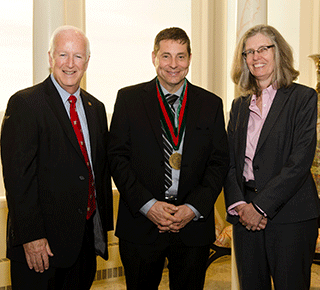
David B. Carr, MD, has been named the inaugural Alan A. and Edith L. Wolff Professor of Geriatric Medicine at Washington University School of Medicine in St. Louis.
The appointment was announced by Chancellor Mark S. Wrighton and Larry J. Shapiro, MD, executive vice chancellor for medical affairs and dean of the School of Medicine.
Carr is a professor of medicine and of neurology and clinical director of the Division of Geriatrics and Nutritional Science. He also is medical director of The Rehabilitation Institute of St. Louis and Parc Provence, a community facility for dementia care.
A specialist in the effects of brain injury and aging on driving skills, Carr treats patients with dementia at the School of Medicine’s Memory Diagnostic Center and is a clinician in the Memory and Aging Project at the Charles F. and Joanne Knight Alzheimer’s Disease Research Center.
“As more and more of the population enter their golden years, David Carr’s research is helping us understand how to balance the need to keep our roads safe with seniors’ needs to continue to be mobile and remain active in their communities,” Wrighton said.
Said Carr: “I am honored by this new appointment and grateful for the support it will provide to expand efforts to evaluate fitness to drive among medically impaired older adults and to prolong seniors’ time as safe drivers. It can be devastating to lose the privilege of driving. Depression and anxiety increase, social connections are lost, and the risk of entering a nursing home rises.”
Shapiro lauded Carr for the influence of his work.
“David’s efforts have attracted support from multiple departments in the School of Medicine because they address a set of issues that are important for community safety and healthy aging, and that touch the lives of people in many different ways,” Shapiro said.
Carr was chief editor of the American Medical
Association’s second edition of the Physician’s Guide to Assessing and
Counseling Older Drivers.
Carr and his collaborators recently established a driving laboratory at The Rehabilitation Institute of St. Louis. The lab includes a full-scale driving simulator with a cab, seat, pedals, steering wheel and other adaptive controls. The simulator presents realistic driving scenarios and can precisely track drivers’ eye and head movements.
“The hope is that if we identify driving errors that are common in patients who have early Alzheimer’s disease but do not yet have dementia, we can use the simulator and other educational interventions to retrain seniors and prolong the time they are able to drive safely,” Carr said.
The laboratory one day also may provide an affordable alternative to on-the-road evaluations of driving fitness, which now cost as much as $300. But researchers first have to establish that the laboratory is as effective at predicting driving problems as on-the-road tests.
Carr earned his medical degree at the University of Missouri-Columbia in 1985. He completed an internal medicine residency at Michigan State University in 1988 and a fellowship in geriatrics at Duke University in 1990. In 1994, he joined the Washington University faculty in the Division of Geriatrics.
His previous awards and recognitions have included the Distinguished Clinical Faculty Award from the School of Medicine in 2013, given in recognition of his achievements in clinical care, community service, research and teaching. Carr also received the HealthSouth Patient Experience Award in 2012; the HealthSouth Regional Medical Director Leadership Award in 2007 and 2010; and the Franz U. Steinberg Award for Teaching Excellence in Physical Medicine and Rehabilitation this year.
About the Wolffs
Alan and Edith Wolff owned Wolff Construction Co., a real-estate development, investment and management company. Alan Wolff founded the company in the 1940s and led it until his death in 1989. Edith Wolff then took up leadership as the company’s president until her death in 2008.
Over the course of more than 30 years, gifts from the Wolffs have supported many areas of research at the School of Medicine, including projects involving Alzheimer’s disease, heart transplantation, bacterial sepsis infection, dermatology, cell biology and critical care medicine. They have provided funding for 13 endowed professorships, seven distinguished endowed professorships and specific research funds in cancer and ophthalmology. Their donations also support the Edith L. Wolff Scholarship Loan Fund, a noninterest-bearing fund for medical students.
In 2007, Edith Wolff committed $20 million to establish the Alan A. and Edith L. Wolff Institute at the School of Medicine, with the goal of advancing the most promising biomedical research projects focused on preventing, treating and curing disease.
In recognition of her generous support of medical research, Edith Wolff received numerous awards from Washington University, including the Robert S. Brookings Award, the Second Century Award from the School of Medicine and an honorary doctorate in 2004.